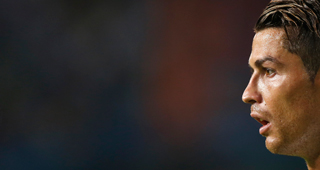There was a point this past Saturday, a day on which Cristiano Ronaldo scored four goals, that the Santiago Bernabéu hissed at him. This was when the match against Celta Vigo was still in the balance, early in the second half, when Real Madrid were up 1-0 and attacking the Galician side not with verve so much as weary impatience. Ronaldo thought one thing, Dani Carvajal thought another, and his pass to the fullback ran out of play. And the Bernabéu laid into their star, as they do when he’s not playing well, in part because a vocal portion of Madridistas are a fickle and importunate bunch, and in part because there’s never been deep affection there, between fans of the biggest club in the world and if not the best player of his generation, then at least the most loudly great one. Ronaldo scored just 82 seconds after those whistles sounded—walloped a dipping shot into the right-hand corner—and cupped his ear as he ran to the corner flag.
Real Madrid and Ronaldo seem just about done with each other, despite how spectacularly mutually beneficial the relationship has been until very recently. Since moving to the Spanish capital in the summer of 2009, the Portuguese has put up absurd scoring numbers (252 goals in 228 games) and warped and broken innumerable La Liga defenses with his speed, slipperiness, and ability to thump the ball onto the goal’s frame from nearly anywhere on the pitch. There are aspects of his game to be lamented—he lacks for defensive effort and he occasionally tries to dribble through a thicket of defenders while a wide open teammate is calling out for a pass—but he catches far too much flak for being a little less saintly and miraculous than his only true contemporary, Leo Messi, and most of the criticisms lobbed Cristiano’s way have more to do with the faces his makes, the slickness of his hair, and his distinctly Iberian masculinity than his shortcomings as a player. Let’s not allow this to get lost in the noise: the Cristiano Ronaldo era at Madrid has been a success, by any measure.
But that era appears to be coming to a close. Ronaldo is 31 and, after a blistering prime, has fallen off a bit. It’s not as if he’s no longer fast or powerful, but fewer games are played in his shadow. Ronaldo used to be an ever-present terror; now he makes himself known in fits and starts. He was never truly a left winger, but for the past couple of seasons, he’s been playing more and more like a striker who happens to start his runs from the left side. A lot of his goals are that of a poacher: one-touch strikes from inside the box, headers, and rebounds. And like a poacher, he has a tendency to drift out of matches for long periods of time. If Real Madrid’s midfield isn’t humming, neither is Ronaldo. He’s either invisible or coming deep to get the ball and trying to take on a back line by himself, which doesn’t work nearly as often as it did when he was in his 20s.
Real Madrid haven’t disappointed this season solely because Ronaldo has lost a step, but they’re a club that would do well to overhaul in the summer, seeking to construct a squad that has stronger balance and more players at least half as interested in defending as they are in creating goals. An aging attacker who doesn’t like to pass or put in tackles and insists on playing in a wide position rather than as a pure nine wouldn’t appear to have much of a place in a team like that, especially considering Madrid have Gareth Bale, who at this point in his career is basically a lesser, younger Cristiano clone. Beyond that, there have been rumblings for a while that Real Madrid could sell Ronaldo to Paris Saint-Germain at some absurd luxury markup price, and Ronaldo himself has made noises about how he plans to stay at Madrid for the foreseeable future, which is less a genuine declaration of intent than a bit of public relations work, intimating to fans that when he gets sold, it won’t be because he asked to be.
If there’s one pitiable thing about Cristiano Ronaldo, it’s that whether he leaves Real Madrid this summer or shortly thereafter, he will not be departing as a hero. Leo Messi got lucky: he was able to grow up in a club that began to realize the best moment in its history in perfect concert with his own development. Ronaldo was purchased by Madrid, like so many before him, joining a lineage of beautiful mercenaries. He has never been its beating heart, couldn’t possibly be. This doesn’t completely explain why he still gets whistled at the Bernabéu. A player who has done so much for his club should be afforded sturdier respect. But in the end, more than anything else, Ronaldo’s Real Madrid tenure has been an extraordinarily fruitful business relationship, one whose utility to both sides seems to be waning. And business relationships usually end unceremoniously, with a handshake and some paperwork. That’s the inevitable future bearing down on Cristiano. He still has time to delight and astound the Madridistas, but he doesn’t have nearly enough to win their love.



